|

Torrent Description
2014.11.17
Oonche Log (1965) MHCe DVD5 - Eng Subs - Ashok Kumar, KR. Vijaya [DDR] Oonche Log (High Society People) as a 1965 Hindi film directed by Phani Majumdar. It was based on play Major Chandrakant by noted Tamil film director-screenwriter, K. Balachander. The main character roles of this film were played by Ashok Kumar, Raaj Kumar and Feroz Khan. Its lyrics were composed by Majrooh Sultanpuri and the music was given by Chitragupta. The film was shot at Vauhini Studios, Chennai, was also noted as first big hit of newcomer Feroz Khan, who was noted for his sensitive performance against veterans like Raaj Kumar and Ashok Kumar. At the 13th National Film Awards it won the award for Second Best Feature Film in Hindi It was later remade by K. Balachander himself as Major Chandrakanth (1966), starring J. Jayalalitha and Muthuraman. CAST:- Ashok Kumar as Retd. Major Chandrakant Raaj Kumar as Inspector Shreekant (Shree) K.R. Vijaya as Vimla Prabhu Feroz Khan as Rajnikant / Rajjo Kanhaiyalal as Gunichand Tarun Bose as Mohan Prabhu Kumud Tripathi as Juman Moradabadi Radheshyam Produced by Sathyam - Nanjundan Directed by Phani Majumdar Music Director: Chitragupta Lyricist: Majrooh Sultanpuri Playback Singers:- Lata Mangeshkar, Asha Bhosle, Mohammed Rafi, Manna Dey, Mahendra Kapoor Songs are included in MP3s Oonche Log (1965) 00. Title Music and Screen Credits, Chitragupt Oonche Log (1965) 01. Jaag Dil-e-Deewana, Mohammed Rafi, Majrooh Sultanpuri, Chitragupt Oonche Log (1965) 02. Aaja Re Mere Pyar Ke Raahi, Lata Mangeshkar, Mahendra Kapoor, Majrooh Sultanpuri, Chitragupt Oonche Log (1965) 03. Hai Re Tere Chanchal Nainwam, Lata Mangeshkar, Majrooh Sultanpuri, Chitragupt Oonche Log (1965) 04. Kaisi Tune Reet Rachi Bhagwan-1, Asha Bhosle, Manna Dey, Majrooh Sultanpuri, Chitragupt Oonche Log (1965) 05. Ajab Teri Duniya, Asha Bhosle, Manna Dey, Majrooh Sultanpuri, Chitragupt Oonche Log (1965) 06. END SONG, Asha Bhosle, Manna Dey, Majrooh Sultanpuri, Chitragupt MOVIE REVIEW:- Oonche Log (1965) by MEMSAAB http://memsaabstory.com/2009/05/04/oonche-log-1965/ Now and then a film comes along that gives the viewer true insight into the time and place in which it is set. Iâ™m not talking about flowered go-go boots or violently patterned wallpaper here, but about a look at the generation that is passing and the one taking its place; about moving forward and looking back, and setting a course for the future. Most of the tributes to Feroz Khan that Iâ™ve read in the week since his death have mentioned Oonche Log as the movie that established him in his career, and I can certainly see why. He holds his own with ease opposite two established and charismatic actors, Ashok Kumar and Raaj Kumar, in a complex and layered story requiring skillful, nuanced performances (there are very few characters). Widower Chandrakant (Ashok Kumar) is a blind retired Army Major with two sons: Shri (Raaj Kumar) and Rajjo (Feroz Khan). The Major is a proud man who doesnâ™t let his blindness stop him from seeing much, and he commands great respect in Ooty, where they live. Shri is an upright, rigidly honest police inspector. Rajjo has just finished college, and is handsome, charming and clearly spoiled. The story begins as Rajjo arrives home, to the great joy of his family and their long-time servant Juman (Kumud Tripathi). But Shri sees some changes in his little brother that trouble him. Juman is more a member of the family than a servant, although in the afternoon the Major gives him three lashes after he inadvertently insults a guest (thereby blotting the Majorâ™s honor). A disapproving witness, Shri reminds the Major that nowadays he could be arrested for beating even a servant. Juman himself doesnâ™t seem to mind much, and later when the Major gives him 50 rupees because heâ™s feeling bad about the incident, Juman shows it to Shri saying: “You wanted to deprive me of this.” Itâ™s one of many instances where the generation gap between Shri and his father are highlighted, despite their great similarities in character. That evening Rajjo abruptly scolds Juman for not having made up his bed yet. As Juman leaves his dinner and scurries upstairs to take care of it, the Major gently reprimands Rajjo for treating his “uncle” that way and tells him to apologize to Juman. Rajjo does so, and all is forgiven although Iâ™m not sure why the Major was okay with his own whipping of Juman, but not with Rajjoâ™s rudeness. Rajjo lies awake after everyone has gone to bed waiting for a phone call. It comes, and he arranges to meet his sweetheart Bimla in Kodaikanal in three daysâ™ time. After he hangs up, he sings the lovely song (all the songs are beautiful, by Chitragupta), “Jag Dil-E-Deewana Rut Jaagi.” He definitely is channeling Shammi, too! The next morning he tells Shri and his father that his friends want to meet him for a holiday in Kodaikanal. They refuse, but encourage him to go. Off he goes to romance Bimla. One of the interesting things about this movie is that there are only two women actually seen in it, and they are extremely peripheral with hardly any screen time. One of them is the wife of the Majorâ™s friend Gunichand, the local schoolmaster, who wants to get his daughter Pallavi (who is never seen) engaged to Rajjo. She (the wife) is a harridan who sets their dog on her poor husband. Naturally I have to screencap the dog. The other is Bimla herself (KR Vijaya). When Rajjo meets her in Kodaikanal they sing a pretty duet—”Aaja Re Mere Pyar”—but she is mostly hidden from us; we see her only behind things, from a distance, or in profile, but very rarely (if ever) a full face. I am not complaining about it, but itâ™s very odd and Iâ™m not sure if thereâ™s supposed to be a message there that I missed. Great pains are taken to keep her mostly hidden. Perhaps itâ™s meant as a symbolic statement about the status of women in India! Rajjo returns home after a while, but says nothing to his family about Bimla. On his birthday, Shri gives him a radio, and he fantasizes about her to another lovely song, “Haye Re Tere Chanchal.” His father has all but promised Gunichand that Rajjo will marry Pallavi, and they are looking for an auspicious date. One day a letter arrives addressed to “Shri Kant”. Shri reads it but itâ™s a letter for Rajjo from Bimla, who is pregnant, and desperate for Rajjo to come and marry her before her brother finds out. When Shri confronts Rajjo about it, Rajjo attempts to wriggle out of it. Cad! Upset and angry, Shri tells Rajjo to go and do the right thing by Bimla and bring her home as his bride. Yay Shri! Rajjo does go to see her, but reluctantly—and he steals a thousand rupees from his father on his way out. After he leaves, a telegram from Bimla arrives and the Major receives it. Shri covers up for Rajjo, both about Bimlaâ™s situation and when the Major discovers that his money is missing. On the train to Kodai, an old man and his son sing a song: “Kaisi Tune Reet Rachi” as Rajjo sits in his seat and counts the stolen money. Thank goodness for subtitles! The words prick Rajjoâ™s conscience a little bit, but he soothes it by giving the singers a small amount and settles back smugly in his seat. I am wondering where his father and Shri went wrong, to have brought up a boy so different from them, so lacking in integrity and empathy for others. Then I laugh as the next lyric comes up on screen: Iâ™m reminded once again of my tendency to forget that the Indian viewpoint can be quite different from mine! Anyway, Rajjo meets Bimla and explains to her that he has to speak with his father before he can marry her. She understands clearly that heâ™s too weak and self-serving to do the right thing by her. During this scene we only see her from behind as she weeps bitterly and tells him to get out. Later at his lab, her scientist brother (a very young Tarun Bose) receives a phone call—his sister is dead. She has left behind a note explaining everything. Her brother rushes to the hostel to see Rajjo, who has just left to catch the train home. On the train, Rajjo shares a compartment with a talkative fat man (is there any other kind of train passenger in Hindi cinema?) until he reaches his station. But he is not alone; another passenger enters the compartment as the train pulls away. Itâ™s poor Bimlaâ™s brother, and he is in a rage. What happens next? Will he avenge his sisterâ™s death? Will the Major and Shri find out what Rajjo has done? The story from here takes some unexpected twists and turns. Do watch it to find out what happens; itâ™s a very well-done film and well worth a few hours of your time. All three main characters are beautifully fleshed out (director Phani Majumdar also wrote the screenplay) and the actors bring them to vivid life. Itâ™s not a happy tale, but it is so nicely handled on all fronts that you are drawn in. There is no black or white here, only shades of gray. Feroz Khan as Rajjo gives a brilliant performance—you cannot totally dislike Rajjo, no matter how selfish he is or how poor his choices. Itâ™s easy to see why his father and brother have indulged him. Oonche Log also reminded me a little bit of the fantastic 1939 George Cukor movie The Women. That film had no men in it, although their presence in the lives of the women onscreen was palpable. In this too, although the women were given little or no screen time, they were very present: the Majorâ™s beloved wife, tragically mistreated Bimla, the bahu-to-be Pallavi. But it is the values and concerns of the father and his sons which are at the heart of the film. If you are a fan of any of the three central actors, donâ™t miss it. After the passing of his wife, Lakshmi, retired Indian Army Major Chandrakant, though blind, lives a wealthy lifestyle with his two sons, Rajnikant, a member of the National Cadet Corps, and Inspector Shreekant. He would like to get Rajnikant married to Pallavi, the only daughter of hen-pecked school-master Gunichand, as well as get Shreekant also married to another girl, both on the same day. Gunichand accordingly makes arrangements for a joint wedding to take place on 11th May. Before that could happen, Rajnikant, who has to return for training, must undertake a journey to visit a woman, Vimla Prabhu, whose husband is ill, and Chandrakant gives him some money from his wallet. Quite mysteriously, Chandrakant's finds all his money missing, and after inquiring, will get Shreekant to admit that he had taken the money without permission. Chandrakant does not know that Shreekant is not being forthright and is concealing a terrible life-changing secret. A retired and blind army major's life undergoes many changes after he decides to get his sons married. 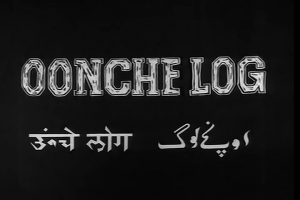 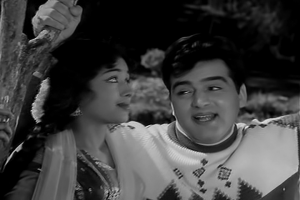 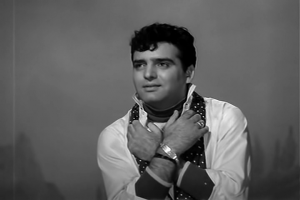 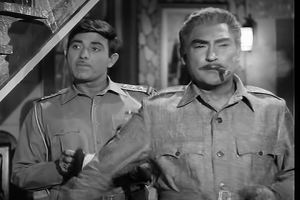 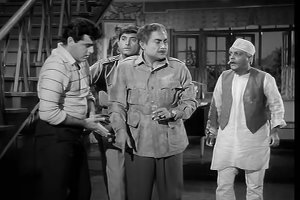 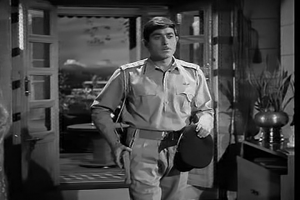 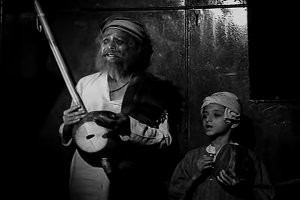 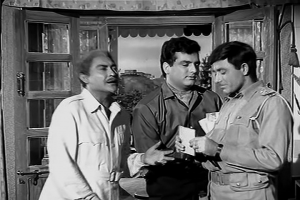 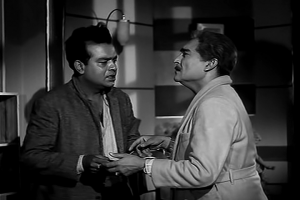 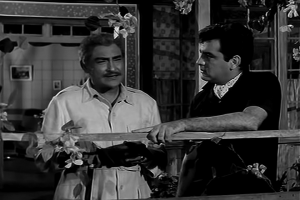 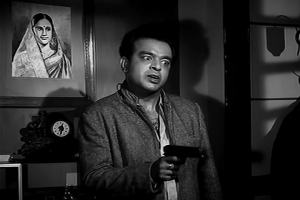 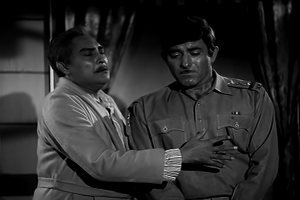 TECHNICAL SPECIFICATIONS:- Video Codec: MPEG-2 Video Bitrate: 2987 kbps Video Resolution: 720x480 Video Aspect Ratio: 1.333:1 Frames Per Second: 29.970 Audio Codec: AC3 Audio Bitrate: 448kb/s CBR 48000 Hz Audio Streams: 6 Audio Languages: Hindi RunTime: 2:18:31 Subtitles: English Ripped by: Trinidad [DDR] Duration: 139 mins 
Comments
No comments
|

 Hindi
Hindi